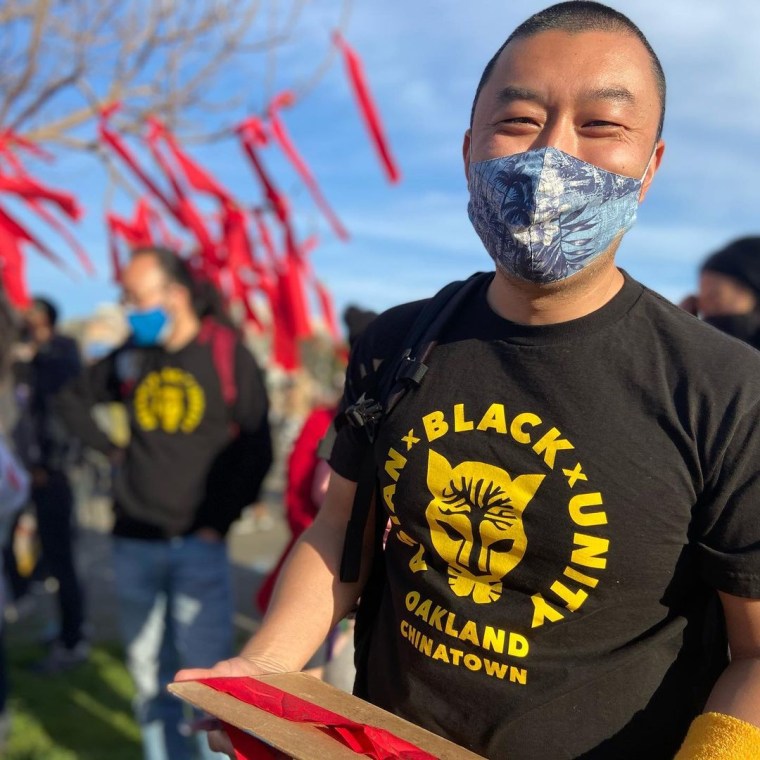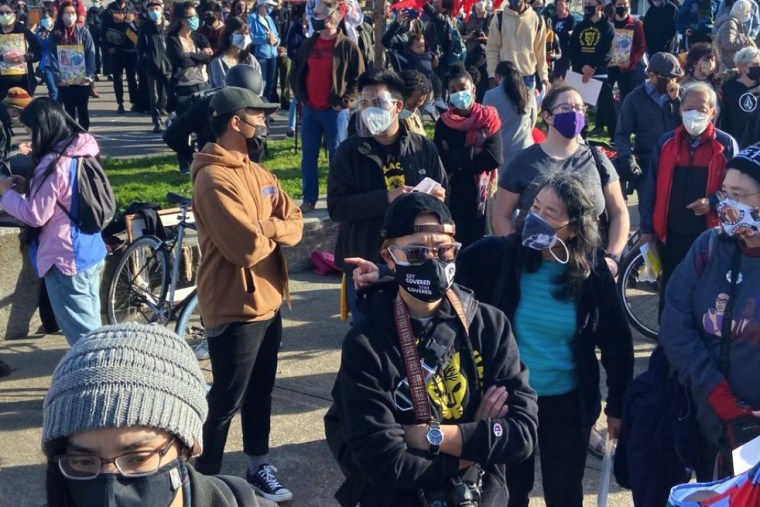When Ariel Hsu saw a graphic video last week of an Asian American senior citizen in San Francisco being pushed to the ground and the growing social media response around it, she said she was concerned — about both the victim and the outcry.
Hsu, a chapter leader at the National Asian American Pacific American Women’s Forum, said that given that the suspect in the incident is Black, many in the Asian American and Pacific Islander (AAPI) community, including herself, were concerned about anti-Black sentiment that appeared to be present in some of the online calls for justice.
The online attention has prompted a conversation on coalition building and allyship that has been growing since last summer’s racial reckoning. Experts point out Asian Americans have the right to feel safe but calls for increased security could have unintended consequences.
For organizers like Hsu, seeing the actor Daniel Dae Kim offer a $25,000 reward for information on the suspect felt like a “bounty,” she said, and the increased calls for more police presence seemed like a backwards step.
“If addressing violence against Asian Americans entails furthering stereotypes about Black criminality and the policies associated with those stereotypes … we’ve misdiagnosed the problem,” said Janelle Wong, a professor of Asian American studies at the University of Maryland.
“If addressing violence against Asian Americans entails furthering stereotypes about Black criminality and the policies associated with those stereotypes … we’ve misdiagnosed the problem,” said Janelle Wong, a professor of Asian American studies at the University of Maryland.
Experts point out the wave of violence against Asian Americans during the pandemic has left the community reeling with concern and fear, especially for older people. These attacks have also come as the Asian American community deals with the medical and economic crises that have come with the pandemic, too.
What further complicates the issue is that there is little data documenting hate crimes against Asian Americans. A widely reported number citing a 1,900 percent increase in hate crimes against Asian Americans in New York shows that the number of hate crimes jumped from one to 20 in a year. StopAAPIHate, a group that has been tracking hate incidents — which can include verbal racial slurs and attacks that do not include violence — has tallied 2,800 since last March.
Asian Americans being left out of data gathering of any kind has been a long-standing concern, especially during the pandemic, and has contributed to some of the frustrations surrounding the community being erased.
But multicultural communities are taking it upon themselves to support one another with mutual aid efforts. Dozens of Asian American organizations in the Bay Area issued a statement calling for more community based solutions rather than relying on increased policing. Groups have coordinated efforts to bring in volunteers to walk older Asian Americans as they run errands. Last weekend in Oakland, California, Black and Asian Americans held a rally of solidarity to push back on the narrative of one community targeting another.

“It felt like a proper response that wasn't just, ‘We need more cops, we need more cops, we need more cops.’”
Tommy Wong helps run GoodGoodEatz in Oakland, which connects ethnic food districts across the city. He said the rally was a signal of a generational shift in his city’s Chinatown for young people who grew up in a multiracial area.
“It was a combination of mourning, which is what it should be. I think it's totally right that Asian Americans and others are saying we need to step up and pay attention to anti-Asian racism. But that's not the only thing,” he said about the rally.
“It felt good. It felt like a proper response that wasn't just, ‘We need more cops, we need more cops, we need more cops.’”
Brad Jenkins, who helped launch #TheNew to engage AAPI voters last year, also attended the rally in Oakland.
“White supremacy has always pitted racial groups against one another,” Jenkins said in an email, “These communities have long fought against violence and hatred while many in the Asian American community have stayed silent in the past. So yes, Asian American leaders do realize that we must find strength in combating this violence -- but, we also recognize that our African American brothers and sisters deal with this hatred and violence every single day of our lives.”
Janelle Wong also points out that the two groups might find that a common factor in racial bias against Asian and Black Americans is white supremacy.
Laws used to limit the number of Asians who could immigrate to the United States, and Asians were often labeled as “invaders or disease carriers.” During the pandemic, lawmakers, including then-President Donald Trump built on that, referring to Covid-19 as the “China virus.”
"The ideas that fuel anti-Asian prejudice really come from our nation’s white supremacist history and can’t be separated from that history,” Wong and her colleague Rossina Zamora Liu, who both teach Asian American studies at the University of Maryland, say in a new essay, “Engaging in anti-Black rhetoric or blame does nothing to get at the roots of this prejudice.”
Some activists are also encouraging people in the community to listen to those who have been doing the work of community building in the field, rather than viral social media posts or celebrities. Long-term coalition building can make far more of an impact, which Janelle Wong points out is backed up by data.
After the Rodney King beating in Los Angeles in 1991 and the race riots the subsequent year, almost all the immediate attention was on Black-Asian conflict, she says. But decades later, in a survey done by AAPIData in 2016, Korean Americans had some of the most progressive stances on social justice issues and greater equality for Black Americans.
“In the wake of the 1992 civil unrest, there was actually a lot of work done to mitigate against deepening conflict there. And it was really Black and Asian American leaders who did a lot of work outside of the media,” she said, “That was a case where community leadership, community organizing mattered.”
Follow NBC Asian America on Facebook, Twitter and Instagram.
